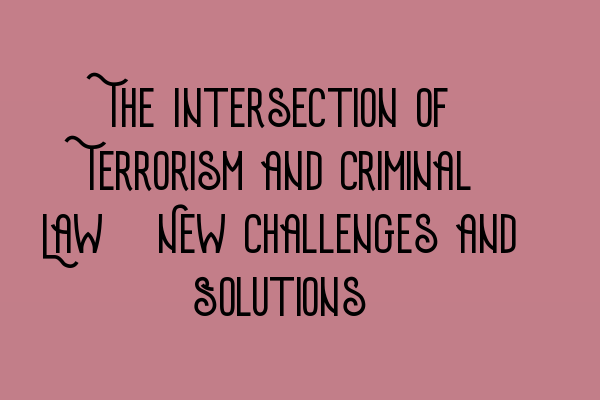The Intersection of Terrorism and Criminal Law: New Challenges and Solutions
Terrorism is a grave concern both globally and within the United Kingdom. It poses significant threats to national security, public safety, and social cohesion. As criminal solicitors, it is our responsibility to navigate the complexities of the intersection between terrorism and criminal law, ensuring justice prevails while safeguarding the rights of individuals involved.
Given the evolving nature of terrorism, practitioners must stay updated and well-versed in the latest legislative developments, investigative techniques, and emerging challenges. This blog post aims to shed light on some of the key challenges faced by criminal law solicitors in terrorism cases and explore potential solutions.
Legislative Framework
The legislative framework governing terrorism offenses is extensive and intricate. The UK has implemented various laws, including the Terrorism Act 2000 and the Terrorism Act 2006, to combat terrorism effectively. Familiarity with these statutes is crucial for any solicitor involved in terrorism-related cases.
It is important to note that the Solicitors Qualifying Examination (SQE) provides comprehensive training and assessment on the relevant legal frameworks, equipping aspiring solicitors with the necessary knowledge to handle terrorism cases. To enhance your understanding of the legislative framework, you can also explore SQE 1 Practice Exam Questionshere.
Investigative Challenges
Terrorism investigations present unique challenges due to their sensitive nature and often involve complex international networks. Solicitors must be prepared to tackle issues related to digital evidence, surveillance, intelligence sharing, and human rights considerations.
To enhance your investigative skills and effectively navigate these challenges, consider enrolling in SQE 2 Preparation Courseshere. These courses offer practical guidance and insights from experienced professionals to help you excel in terrorism-related cases.
Human Rights Implications
The fight against terrorism must not undermine human rights and civil liberties. Solicitors play a critical role in ensuring that all individuals, including those accused of terrorism offenses, receive fair treatment and due process.
Acquiring a thorough understanding of human rights law and its application in terrorism cases is essential. SQE 1 Preparation Coursesherecan help you develop this understanding and equip you with the necessary skills to uphold the principles of justice and fairness.
Collaboration and Counter-Terrorism Strategies
Tackling terrorism requires a multi-agency approach and close collaboration between law enforcement agencies, intelligence services, and legal professionals. Sharing knowledge, resources, and expertise is key to formulating effective counter-terrorism strategies.
Participating in SQE 1 Practice Mocks FLK1 FLK2hereensures that you are well-prepared to engage in meaningful collaboration and contribute to combating terrorism effectively.
Conclusion
The intersection of terrorism and criminal law presents new challenges and demands a comprehensive understanding of the legislative framework, investigative techniques, human rights considerations, and effective collaboration. By staying updated and enhancing your skills through SQE training and preparation, you can navigate these challenges and contribute to the pursuit of justice and national security.
For more information on SQE exams and upcoming dates, you can visit the SRA SQE Exam Dateshere.
